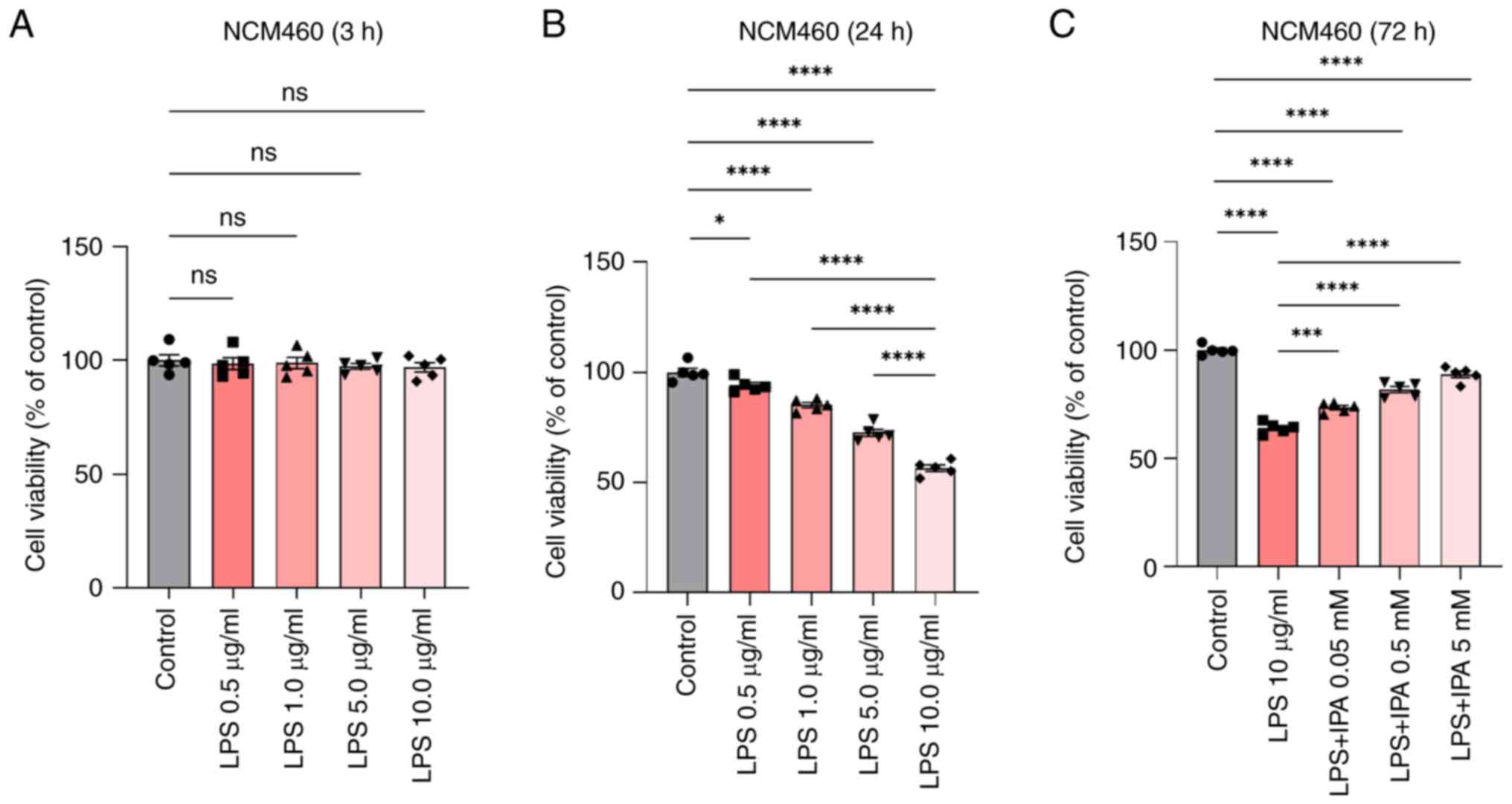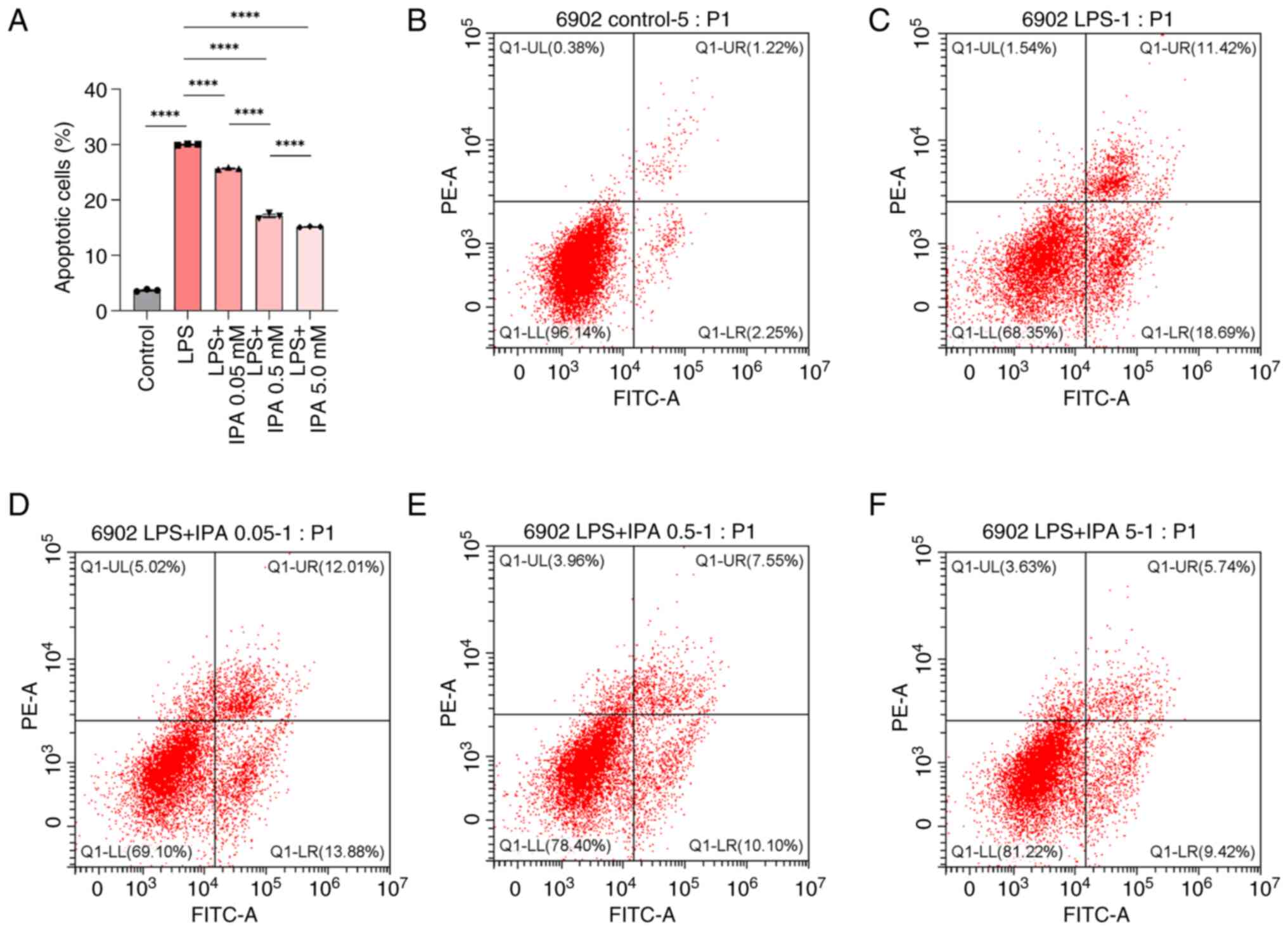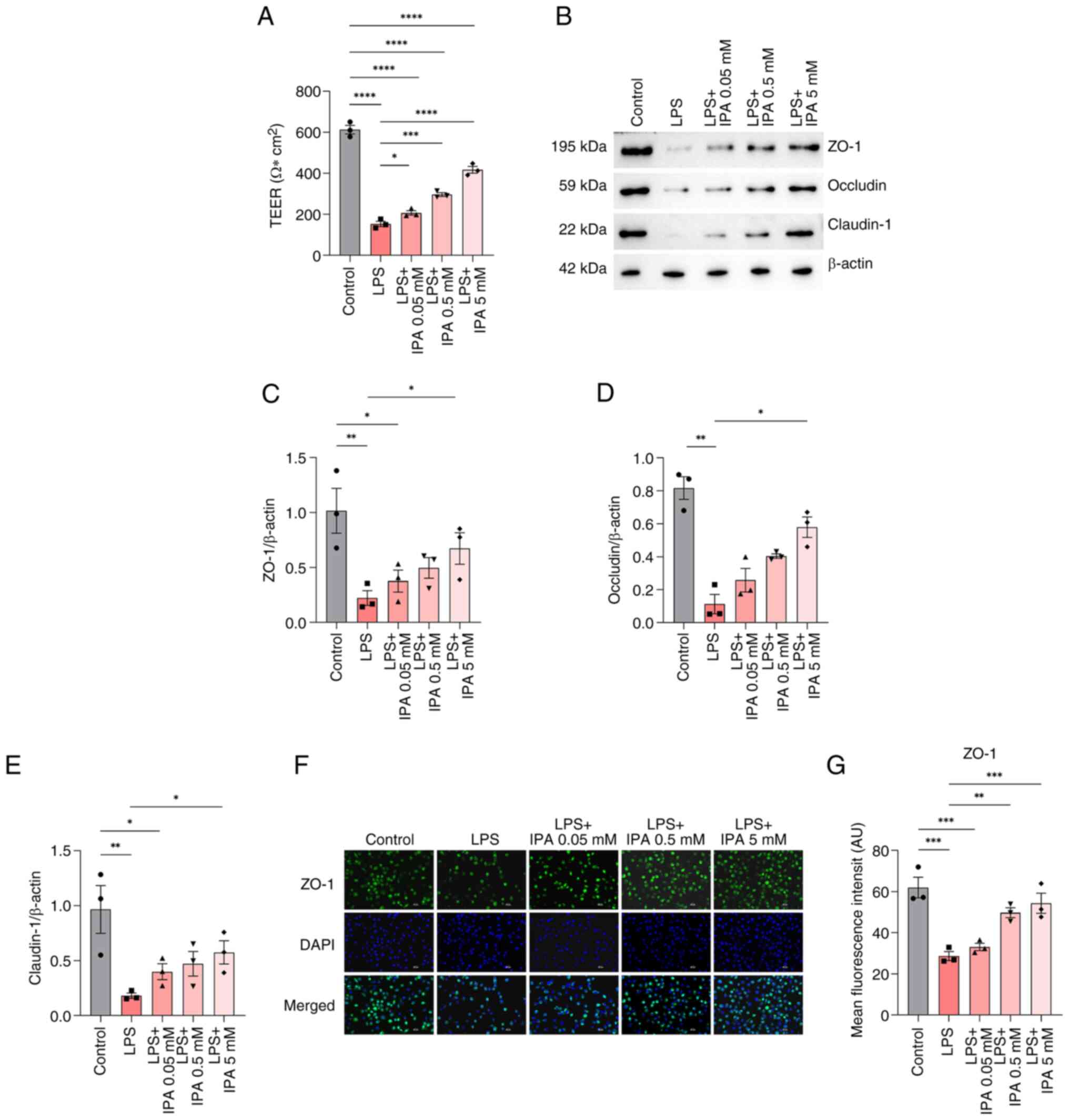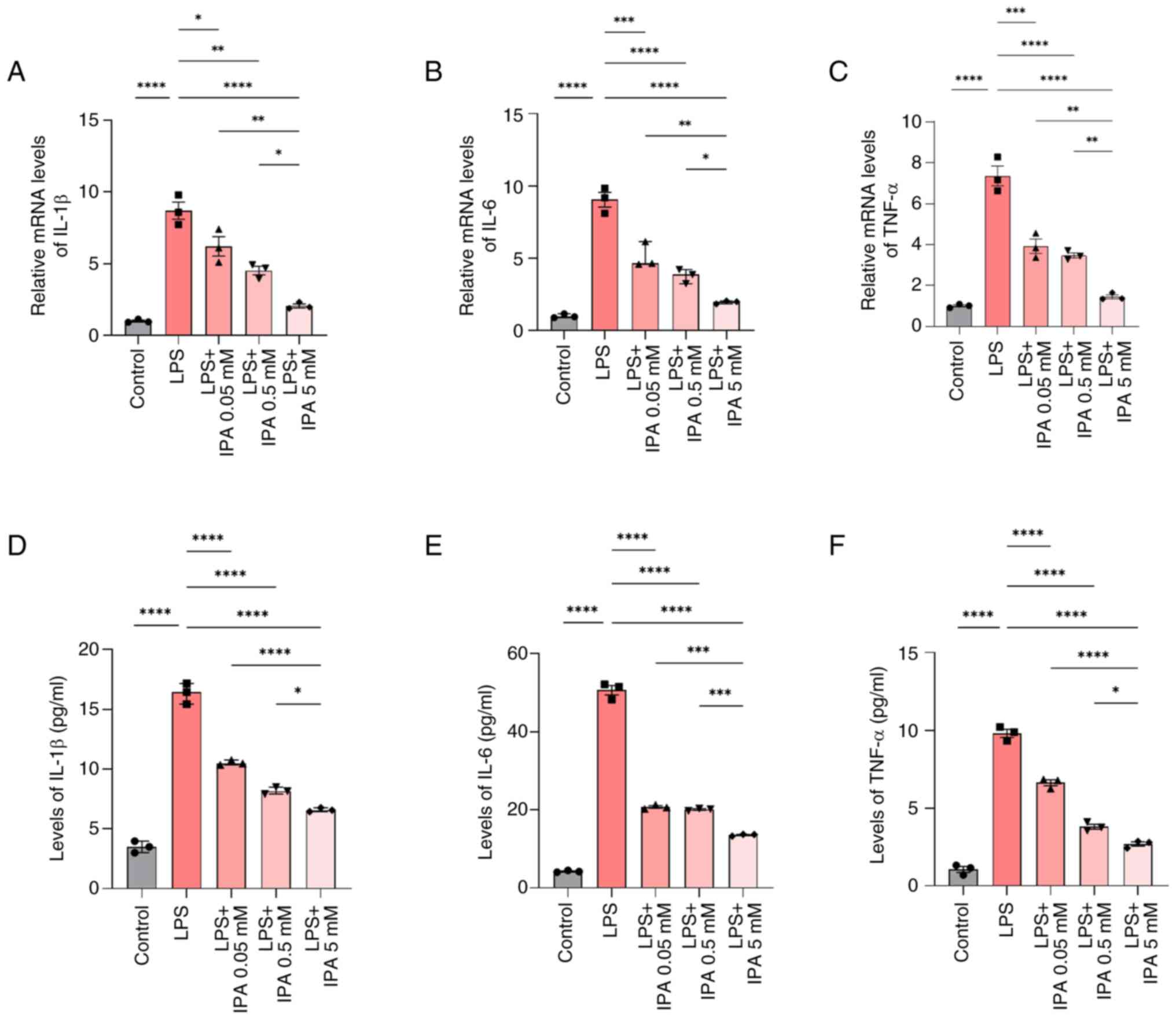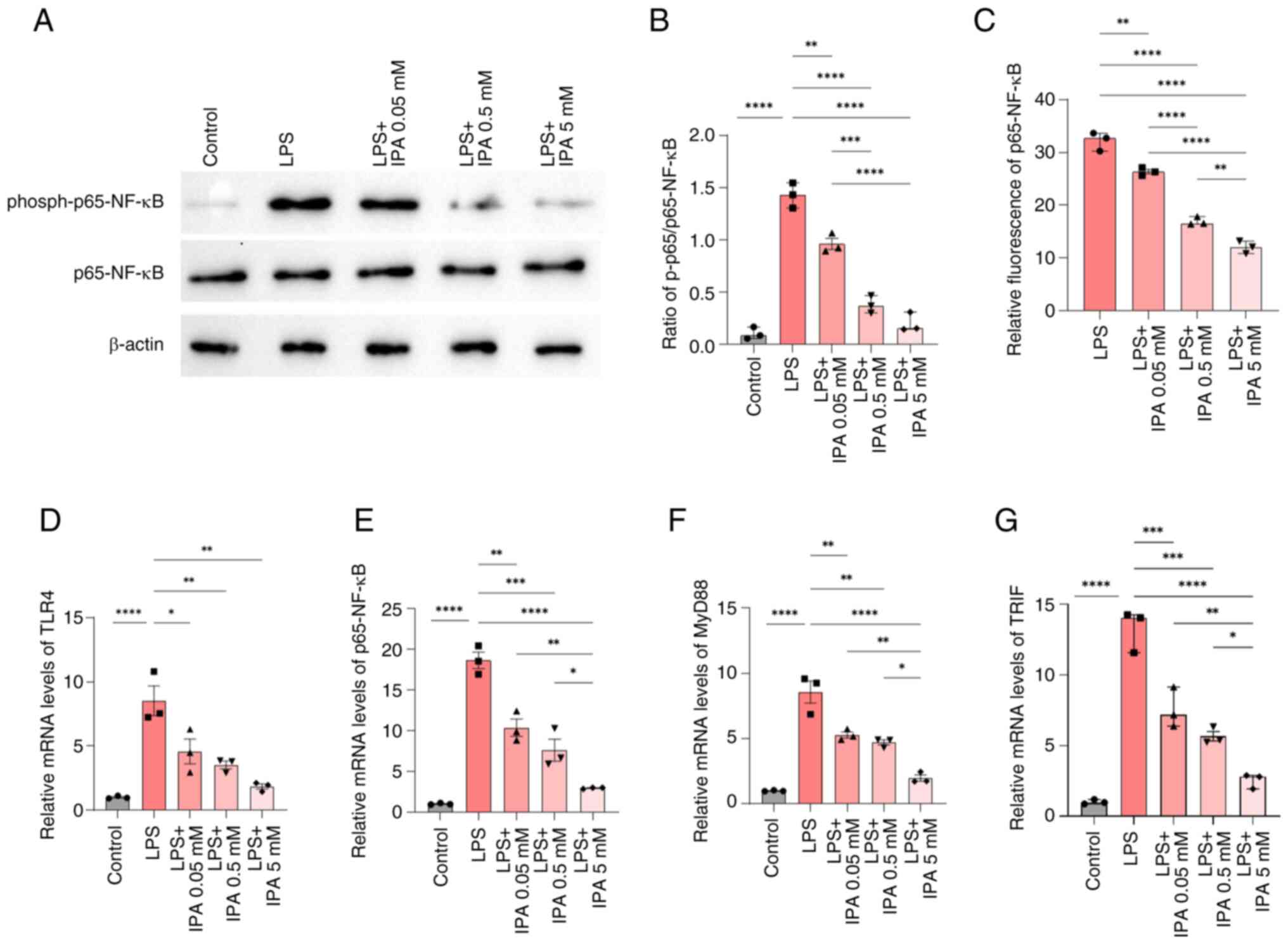|
1
|
Wlodarska M, Luo C, Kolde R, d'Hennezel E,
Annand JW, Heim CE, Krastel P, Schmitt EK, Omar AS, Creasey EA, et
al: Indoleacrylic acid produced by commensal peptostreptococcus
species suppresses inflammation. Cell Host Microbe. 22:25–37.e6.
2017. View Article : Google Scholar : PubMed/NCBI
|
|
2
|
Wan F, Wang M, Zhong R, Chen L, Han H, Liu
L, Zhao Y, Lv H, Hou F, Yi B and Zhang H: Supplementation With
chinese medicinal plant extracts from lonicera hypoglauca and
scutellaria baicalensis mitigates colonic inflammation by
regulating oxidative stress and gut microbiota in a colitis mouse
model. Front Cell Infect Microbiol. 11:7980522022. View Article : Google Scholar : PubMed/NCBI
|
|
3
|
Xu QQ, Su ZR, Yang W, Zhong M, Xian YF and
Lin ZX: Patchouli alcohol attenuates the cognitive deficits in a
transgenic mouse model of Alzheimer's disease via modulating
neuropathology and gut microbiota through suppressing C/EBPβ/AEP
pathway. J Neuroinflammation. 20:192023. View Article : Google Scholar : PubMed/NCBI
|
|
4
|
Wang Z, Cao Y, Zhang K, Guo Z, Liu Y, Zhou
P, Liu Z and Lu X: Gold nanoparticles alleviates the
lipopolysaccharide-induced intestinal epithelial barrier
dysfunction. Bioengineered. 12:6472–6483. 2021. View Article : Google Scholar : PubMed/NCBI
|
|
5
|
Wang Y, Lin J, Cheng Z, Wang T, Chen J and
Long M: Bacillus coagulans TL3 inhibits LPS-induced caecum damage
in rat by regulating the TLR4/MyD88/NF-κB and Nrf2 signal pathways
and modulating intestinal microflora. Oxid Med Cell Longev.
2022:54632902022.PubMed/NCBI
|
|
6
|
Hasain Z, Che Roos NA, Rahmat F, Mustapa
M, Raja Ali RA and Mokhtar NM: Diet and pre-intervention washout
modifies the effects of probiotics on gestational diabetes
mellitus: A comprehensive systematic review and meta-analysis of
randomized controlled trials. Nutrients. 13:30452021. View Article : Google Scholar : PubMed/NCBI
|
|
7
|
Knudsen C, Neyrinck AM, Leyrolle Q, Baldin
P, Leclercq S, Rodriguez J, Beaumont M, Cani PD, Bindels LB,
Lanthier N and Delzenne N: Hepatoprotective effects of indole, a
gut microbial metabolite, in leptin-deficient obese mice. J Nutr.
151:1507–1516. 2021. View Article : Google Scholar : PubMed/NCBI
|
|
8
|
Konopelski P and Ufnal M: Indoles-gut
bacteria metabolites of tryptophan with pharmacotherapeutic
potential. Curr Drug Metab. 19:883–890. 2018. View Article : Google Scholar : PubMed/NCBI
|
|
9
|
Liu Q, Yu Z, Tian F, Zhao J, Zhang H, Zhai
Q and Chen W: Surface components and metabolites of probiotics for
regulation of intestinal epithelial barrier. Microb Cell Fact.
19:232020. View Article : Google Scholar : PubMed/NCBI
|
|
10
|
Alexeev EE, Lanis JM, Kao DJ, Campbell EL,
Kelly CJ, Battista KD, Gerich ME, Jenkins BR, Walk ST, Kominsky DJ
and Colgan SP: Microbiota-derived indole metabolites promote human
and murine intestinal homeostasis through regulation of
interleukin-10 receptor. Am J Pathol. 188:1183–1194. 2018.
View Article : Google Scholar : PubMed/NCBI
|
|
11
|
Li J, Zhang L, Wu T, Li Y, Zhou X and Ruan
Z: Indole-3-propionic acid improved the intestinal barrier by
enhancing epithelial barrier and mucus barrier. J Agric Food Chem.
69:1487–1495. 2021. View Article : Google Scholar : PubMed/NCBI
|
|
12
|
Wu Y, Li J, Ding W, Ruan Z and Zhang L:
Enhanced intestinal barriers by puerarin in combination with
tryptophan. J Agric Food Chem. 69:15575–15584. 2021. View Article : Google Scholar : PubMed/NCBI
|
|
13
|
He S, Wang J, Huang Y, Kong F, Yang R,
Zhan Y, Li Z, Ye C, Meng L, Ren Y, et al: Intestinal fibrosis in
aganglionic segment of Hirschsprung's disease revealed by
single-cell RNA sequencing. Clin Transl Med. 13:e11932023.
View Article : Google Scholar : PubMed/NCBI
|
|
14
|
Yu YH, Lai YH, Hsiao FS and Cheng YH:
Effects of deoxynivalenol and mycotoxin adsorbent agents on
mitogen-activated protein kinase signaling pathways and
inflammation-associated gene expression in porcine intestinal
epithelial cells. Toxins (Basel). 13:3012021. View Article : Google Scholar : PubMed/NCBI
|
|
15
|
Chen X, Liu G, Yuan Y, Wu G, Wang S and
Yuan L: NEK7 interacts with NLRP3 to modulate the pyroptosis in
inflammatory bowel disease via NF-κB signaling. Cell Death Dis.
10:9062019. View Article : Google Scholar : PubMed/NCBI
|
|
16
|
Zeng S, Li W, Ouyang H, Xie Y, Feng X and
Huang L: A novel prognostic pyroptosis-related gene signature
correlates to oxidative stress and immune-related features in
gliomas. Oxid Med Cell Longev. 2023:42561162023. View Article : Google Scholar : PubMed/NCBI
|
|
17
|
Pulakazhi Venu VK, Saifeddine M, Mihara K,
Tsai YC, Nieves K, Alston L, Mani S, McCoy KD, Hollenberg MD and
Hirota SA: The pregnane X receptor and its microbiota-derived
ligand indole 3-propionic acid regulate endothelium-dependent
vasodilation. Am J Physiol Endocrinol Metab. 317:E350–E361. 2019.
View Article : Google Scholar : PubMed/NCBI
|
|
18
|
Venkatesh M, Mukherjee S, Wang H, Li H,
Sun K, Benechet AP, Qiu Z, Maher L, Redinbo MR, Phillips RS, et al:
Symbiotic bacterial metabolites regulate gastrointestinal barrier
function via the xenobiotic sensor PXR and Toll-like receptor 4.
Immunity. 41:296–310. 2014. View Article : Google Scholar : PubMed/NCBI
|
|
19
|
Wang Y, Xi W, Zhang X, Bi X, Liu B, Zheng
X and Chi X: CTSB promotes sepsis-induced acute kidney injury
through activating mitochondrial apoptosis pathway. Front Immunol.
13:10537542023. View Article : Google Scholar : PubMed/NCBI
|
|
20
|
Ismael S, Rodrigues C, Santos GM, Castela
I, Mota IB, Barreiros-Mota I, Almeida MJ, Calhau C, Faria A and
Araújo JR: IPA and its precursors differently modulate the
proliferation, differentiation, and integrity of intestinal
epithelial cells. Nutr Res Pract. 17:616–630. 2023. View Article : Google Scholar : PubMed/NCBI
|
|
21
|
Guo C, Guo D, Fang L, Sang T, Wu J, Guo C,
Wang Y, Wang Y, Chen C, Chen J, et al: Ganoderma lucidum
polysaccharide modulates gut microbiota and immune cell function to
inhibit inflammation and tumorigenesis in colon. Carbohydr Polym.
267:1182312021. View Article : Google Scholar : PubMed/NCBI
|
|
22
|
Livak KJ and Schmittgen TD: Analysis of
relative gene expression data using real-time quantitative PCR and
the 2(−Delta Delta C(T)) method. Methods. 25:402–408. 2001.
View Article : Google Scholar : PubMed/NCBI
|
|
23
|
Zhou Y, Duan L, Zeng Y, Song X, Pan K, Niu
L, Pu Y, Li J, Khalique A, Fang J, et al: The panda-derived
lactiplantibacillus plantarum BSG201683 improves LPS-induced
intestinal inflammation and epithelial barrier disruption in vitro.
BMC Microbiol. 23:2492023. View Article : Google Scholar : PubMed/NCBI
|
|
24
|
Sehgal R, Ilha M, Vaittinen M, Kaminska D,
Männistö V, Kärjä V, Tuomainen M, Hanhineva K, Romeo S, Pajukanta
P, et al: Indole-3-propionic acid, a gut-derived tryptophan
metabolite, associates with hepatic fibrosis. Nutrients.
13:35092021. View Article : Google Scholar : PubMed/NCBI
|
|
25
|
Mimori S, Kawada K, Saito R, Takahashi M,
Mizoi K, Okuma Y, Hosokawa M and Kanzaki T: Indole-3-propionic acid
has chemical chaperone activity and suppresses endoplasmic
reticulum stress-induced neuronal cell death. Biochem Biophys Res
Commun. 517:623–628. 2019. View Article : Google Scholar : PubMed/NCBI
|
|
26
|
Zhang B, Jiang M, Zhao J, Song Y, Du W and
Shi J: The mechanism underlying the influence of indole-3-propionic
acid: A relevance to metabolic disorders. Front Endocrinol
(Lausanne). 13:8417032022. View Article : Google Scholar : PubMed/NCBI
|
|
27
|
Hashimoto Y, Tachibana K, Krug SM,
Kunisawa J, Fromm M and Kondoh M: Potential for tight junction
protein-directed drug development using claudin binders and
angubindin-1. Int J Mol Sci. 20:40162019. View Article : Google Scholar : PubMed/NCBI
|
|
28
|
Su Y, Chen C, Guo L, Du J, Li X and Liu Y:
Ecological balance of oral microbiota is required to maintain oral
mesenchymal stem cell homeostasis. Stem Cells. 36:551–561. 2018.
View Article : Google Scholar : PubMed/NCBI
|
|
29
|
Zhao ZH, Xin FZ, Xue Y, Hu Z, Han Y, Ma F,
Zhou D, Liu XL, Cui A, Liu Z, et al: Indole-3-propionic acid
inhibits gut dysbiosis and endotoxin leakage to attenuate
steatohepatitis in rats. Exp Mol Med. 51:1–14. 2019. View Article : Google Scholar
|
|
30
|
Mu Q, Kirby J, Reilly CM and Luo XM: Leaky
gut as a danger signal for autoimmune diseases. Front Immunol.
8:5982017. View Article : Google Scholar : PubMed/NCBI
|
|
31
|
Shi R, Yu F, Hu X, Liu Y, Jin Y, Ren H, Lu
S, Guo J, Chang J, Li Y, et al: Protective effect of
lactiplantibacillus plantarum subsp. Plantarum SC-5 on dextran
sulfate sodium-induced colitis in mice. Foods. 12:8972023.
View Article : Google Scholar : PubMed/NCBI
|
|
32
|
Zhao X, Zeng H, Lei L, Tong X, Yang L,
Yang Y, Li S, Zhou Y, Luo L, Huang J, et al: Tight junctions and
their regulation by non-coding RNAs. Int J Biol Sci. 17:712–727.
2021. View Article : Google Scholar : PubMed/NCBI
|
|
33
|
He C, Deng J, Hu X, Zhou S, Wu J, Xiao D,
Darko KO, Huang Y, Tao T, Peng M, et al: Vitamin A inhibits the
action of LPS on the intestinal epithelial barrier function and
tight junction proteins. Food Funct. 10:1235–1242. 2019. View Article : Google Scholar : PubMed/NCBI
|
|
34
|
Stephens M and von der Weid PY:
Lipopolysaccharides modulate intestinal epithelial permeability and
inflammation in a species-specific manner. Gut Microbes.
11:421–432. 2020. View Article : Google Scholar : PubMed/NCBI
|
|
35
|
Rothhammer V, Mascanfroni ID, Bunse L,
Takenaka MC, Kenison JE, Mayo L, Chao CC, Patel B, Yan R, Blain M,
et al: Type I interferons and microbial metabolites of tryptophan
modulate astrocyte activity and central nervous system inflammation
via the aryl hydrocarbon receptor. Nat Med. 22:586–597. 2016.
View Article : Google Scholar : PubMed/NCBI
|
|
36
|
Hubbard TD, Murray IA and Perdew GH:
Indole and tryptophan metabolism: Endogenous and dietary routes to
Ah receptor activation. Drug Metab Dispos. 43:1522–1535. 2015.
View Article : Google Scholar : PubMed/NCBI
|
|
37
|
Huang X, Zhu J, Jiang Y, Xu C, Lv Q, Yu D,
Shi K, Ruan Z and Wang Y: SU5416 attenuated
lipopolysaccharide-induced acute lung injury in mice by modulating
properties of vascular endothelial cells. Drug Des Devel Ther.
13:1763–1772. 2019. View Article : Google Scholar : PubMed/NCBI
|















